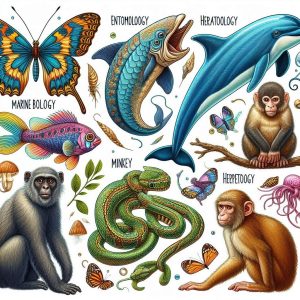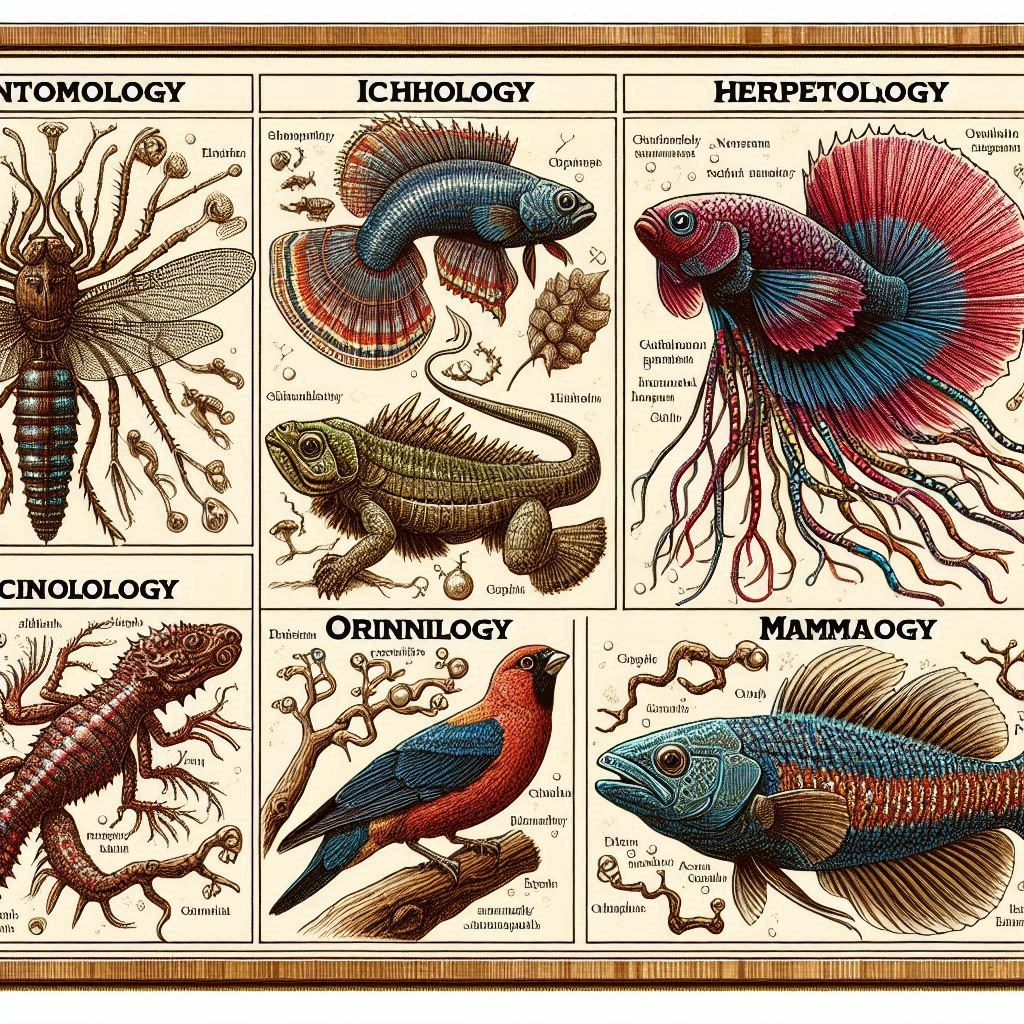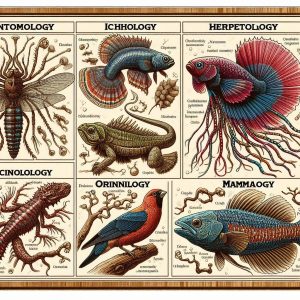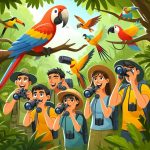Zoology is the branch of biology that focuses on the study of animals. It encompasses a wide range of scientific disciplines, including anatomy, physiology, genetics, evolution, and ecology. By exploring the diverse forms and functions of animals, zoologists seek to understand their behavior, development, and interactions with their environments. This field plays a crucial role in enhancing our knowledge of biodiversity and the interconnectedness of life on Earth.
Branches of Zoology
Zoology is divided into various sub-disciplines that focus on different aspects of animal life. Some of the main branches include:
- Entomology: The study of insects, which are the most diverse group of animals on the planet.
- Ichthyology: The study of fish, including their biology, ecology, and taxonomy.
- Herpetology: The study of reptiles and amphibians, focusing on their physiology, behavior, and conservation.
- Ornithology: The study of birds, encompassing their anatomy, behavior, and ecological roles.
-
Major Branches of Zoology
Branch Focus Area Key Aspects Entomology Study of insects Insect behavior, physiology, ecology Ichthyology Study of fish Fish biology, taxonomy, conservation Herpetology Study of reptiles and amphibians Physiology, behavior, conservation Ornithology Study of birds Bird anatomy, behavior, ecology Mammalogy Study of mammals Evolution, physiology, ecology Importance of Zoology
The study of zoology is vital for several reasons:
- Conservation: Understanding animal behavior and ecology helps in developing effective conservation strategies to protect endangered species and their habitats.
- Medical Research: Animals serve as models in medical research, providing insights into human diseases and leading to the development of new treatments.
- Ecological Balance: Zoologists study the roles of animals in ecosystems, helping to maintain ecological balance and biodiversity.
- Evolutionary Biology: By studying the evolutionary history of animals, zoologists can understand the processes that drive evolution and the relationships between different species.
- Agricultural Benefits: Zoological research contributes to agriculture by understanding the behavior and biology of pests and beneficial insects, leading to better pest control methods and improved crop yields.
- Environmental Monitoring: Animals are often used as bioindicators to monitor environmental health. Changes in animal populations can indicate shifts in environmental conditions, such as pollution levels or climate change impacts.
- Economic Contributions: Zoology-related industries, such as wildlife tourism and animal husbandry, significantly contribute to economies worldwide. Protecting wildlife and promoting sustainable practices ensure long-term economic benefits.
- Educational Value: Zoology educates people about the natural world, fostering a deeper appreciation for biodiversity and the need for conservation. Educational programs and public awareness campaigns often rely on zoological knowledge.

importance of zooogy Importance of Zoology in Conservation and Medicine
Field Application Benefits Conservation Protecting endangered species Ensures biodiversity, ecological balance Medical Research Using animal models to study diseases This leads to new treatments, understanding of diseases Agriculture Studying pests and beneficial insects Improves pest control, crop yields Ecology Understanding ecosystems and food webs Helps in ecosystem management and restoration Conservation Efforts
Zoology plays a crucial role in conservation efforts. By studying animal populations, habitats, and behaviors, zoologists can identify threats and develop strategies to mitigate them. Conservation programs often focus on protecting endangered species and restoring their habitats, ensuring the survival of biodiversity for future generations. Organizations like the World Wildlife Fund (WWF) and the International Union for Conservation of Nature (IUCN) rely on zoological research to guide their efforts.
Medical Advancements
Zoological studies are essential in medical research. Animal models, such as mice, rats, and zebrafish, are widely used to study human diseases and test new treatments. Understanding animal physiology and genetics helps researchers develop drugs, vaccines, and medical procedures that can be translated into human medicine. Institutions like the National Institutes of Health (NIH) and the World Health Organization (WHO) utilize zoological research in their medical advancements.
Ecological Insights
Zoologists study animal interactions within ecosystems, providing critical insights into ecological balance and biodiversity. This knowledge helps in managing natural resources, controlling invasive species, and restoring degraded ecosystems. By understanding food webs, predator-prey dynamics, and species interactions, zoologists contribute to the stability and health of ecosystems. Organizations such as Conservation International and WWF depend on ecological research to guide their conservation efforts.
Agricultural Benefits
Zoological research significantly impacts agriculture by studying pests and beneficial insects. Understanding the behavior, lifecycle, and ecology of pests helps in developing effective pest management strategies, reducing crop damage, and improving yields. Similarly, studying pollinators and natural predators of pests can enhance agricultural productivity. Organizations like the Food and Agriculture Organization (FAO) and the U.S. Department of Agriculture (USDA) utilize zoological insights to promote sustainable agriculture practices.
Environmental Monitoring
Animals serve as bioindicators, reflecting the health of their environments. Changes in animal populations or behaviors can signal environmental issues, such as pollution, habitat destruction, or climate change. Monitoring these indicators helps in the early detection of environmental problems and guides mitigation efforts. Organizations like the Environmental Protection Agency (EPA) and the United Nations Environment Programme (UNEP) rely on zoological data for environmental assessments and policy-making.
Economic Contributions
Zoology-related industries, such as wildlife tourism, zoos, and aquariums, contribute significantly to local and global economies. Sustainable wildlife tourism promotes conservation while providing economic benefits to local communities. Zoological research also supports animal husbandry practices, improving livestock health and productivity. Organizations like the World Association of Zoos and Aquariums (WAZA) and FAO promote the economic and conservation benefits of zoology.
Educational Value
Zoology plays a crucial role in education, inspiring curiosity and a deeper appreciation for the natural world. Educational programs in schools, museums, zoos, and nature centers rely on zoological knowledge to teach students about biodiversity, conservation, and environmental stewardship. Public awareness campaigns and documentaries also use zoological research to educate the broader public. Organizations like the Association of Zoos and Aquariums (AZA) and National Geographic are instrumental in disseminating zoological information for educational purposes.
Mammalogy: The study of mammals, including their evolution, physiology, and ecological interactions.
Key Figures in Zoology
Throughout history, many scientists have made significant contributions to the field of zoology. Some of the key figures include:
- Aristotle: Often considered the father of biology and zoology, Aristotle made detailed observations of various animal species and their behaviors.
- Charles Darwin: His theory of evolution by natural selection revolutionized our understanding of the diversity of life.
- Jane Goodall: Known for her groundbreaking studies on chimpanzee behavior, Goodall’s work has had a profound impact on primatology and conservation.
- Richard Dawkins: A prominent evolutionary biologist, Dawkins has contributed extensively to the understanding of gene-centered evolution.
Future of Zoology
The future of zoology is poised to be shaped by advancements in technology, increasing environmental challenges, and a deeper understanding of the interconnectedness of life. Here are some key areas where zoology is expected to evolve:
Technological Innovations
Technological advancements are revolutionizing the field of zoology. Emerging technologies such as genomics, bioinformatics, and artificial intelligence (AI) are providing new tools for zoologists to study animals at unprecedented levels of detail. Genomic sequencing allows scientists to uncover the genetic basis of behavior, adaptation, and disease resistance in animals. AI and machine learning algorithms help analyze large datasets, predict trends, and identify patterns in animal behavior and ecology.
Climate Change and Conservation
Climate change is one of the most pressing issues facing the world today, and it has significant implications for wildlife. Zoologists are at the forefront of studying the impacts of climate change on animal populations and ecosystems. Future research will focus on understanding how species adapt to changing environments, developing conservation strategies to protect vulnerable species, and mitigating the effects of climate change on biodiversity.
Biodiversity and Ecosystem Health
As human activities continue to threaten biodiversity, the study of zoology will be crucial in monitoring and preserving ecosystem health. Future zoological research will emphasize the importance of maintaining healthy ecosystems, understanding the roles of different species within these systems, and promoting biodiversity conservation. This includes studying the effects of habitat fragmentation, pollution, and invasive species on native wildlife.
Ethical Considerations and Animal Welfare
The ethical treatment of animals is becoming increasingly important in zoological research and conservation. Future zoologists will need to balance scientific inquiry with ethical considerations, ensuring that animal welfare is prioritized. This includes developing humane methods for studying animals, minimizing stress and harm, and advocating for policies that protect animal rights.
Interdisciplinary Collaboration
The future of zoology will involve greater interdisciplinary collaboration. Zoologists will work closely with other scientists, including ecologists, geneticists, veterinarians, and environmental scientists, to address complex biological and environmental challenges. This collaborative approach will enhance our understanding of animal biology, improve conservation efforts, and promote sustainable practices.
Citizen Science and Public Engagement
Citizen science initiatives are playing an increasingly important role in zoological research. Engaging the public in data collection and conservation efforts can provide valuable insights and resources. Future zoologists will leverage citizen science platforms to gather data on animal populations, track migration patterns, and monitor environmental changes. Public engagement will also foster a greater appreciation for wildlife and the need for conservation.
Educational Advancements
Education will continue to be a cornerstone of zoology’s future. Advancements in educational technologies, such as virtual reality and online learning platforms, will enhance the way zoology is taught and learned. These tools will provide immersive experiences, allowing students to explore animal habitats, observe behavior, and conduct virtual experiments. Educational programs will also emphasize the importance of conservation and the role of zoology in addressing global challenges.
Genetic Conservation and De-Extinction
Genetic conservation techniques, such as cryopreservation and cloning, are becoming increasingly feasible and may play a significant role in preserving endangered species. Additionally, the concept of de-extinction, or bringing extinct species back to life through advanced genetic engineering, is gaining attention. While controversial, these technologies could revolutionize conservation efforts, offering new ways to protect biodiversity and restore ecosystems.
Global Policy and Advocacy
Zoologists will continue to influence global policy and advocacy efforts aimed at protecting wildlife and natural habitats. By contributing scientific knowledge to policy discussions, zoologists can help shape regulations and conservation initiatives. Advocacy for sustainable practices, habitat preservation, and climate action will be critical in ensuring the long-term survival of diverse animal species.
Overall, the future of zoology is promising, with numerous opportunities for scientific discovery, conservation, and the protection of biodiversity. By embracing technological innovations, addressing environmental challenges, and fostering interdisciplinary collaboration, zoologists will continue to play a vital role in understanding and preserving the natural world.

Conservation Efforts
Zoology plays a crucial role in conservation efforts. By studying animal populations, habitats, and behaviors, zoologists can identify threats and develop strategies to mitigate them. Conservation programs often focus on protecting endangered species and restoring their habitats, ensuring the survival of biodiversity for future generations. Organizations like the World Wildlife Fund (WWF) and the International Union for Conservation of Nature (IUCN) rely on zoological research to guide their efforts.
Medical Advancements of zoology
Zoological studies are essential in medical research. Animal models, such as mice, rats, and zebrafish, are widely used to study human diseases and test new treatments. Understanding animal physiology and genetics helps researchers develop drugs, vaccines, and medical procedures that can be translated into human medicine. Institutions like the National Institutes of Health (NIH) and the World Health Organization (WHO) utilize zoological research in their medical advancements.
Ecological Insights
Zoologists study animal interactions within ecosystems, providing critical insights into ecological balance and biodiversity. This knowledge helps in managing natural resources, controlling invasive species, and restoring degraded ecosystems. By understanding food webs, predator-prey dynamics, and species interactions, zoologists contribute to the stability and health of ecosystems. Organizations such as Conservation International and WWF depend on ecological research to guide their conservation efforts.
Zoology Benefits in Agricultural
Zoological research contributes significantly to agriculture by studying pests and beneficial insects, which play crucial roles in ecosystem dynamics and agricultural productivity. Organizations like the Food and Agriculture Organization (FAO) and the U.S. Department of Agriculture (USDA) rely on zoological research to support sustainable agricultural practices.
Pest Management
Understanding the behavior, lifecycle, and ecological interactions of pests is essential for developing effective pest management strategies. Zoologists study various pest species, such as insects and rodents, to determine their impact on crops and ecosystems. By identifying natural predators, parasites, and pathogens that regulate pest populations, zoologists help farmers implement integrated pest management (IPM) practices. These practices minimize reliance on chemical pesticides, reduce crop damage, and promote sustainable agricultural practices.
Beneficial Insects
Zoological research also focuses on beneficial insects that contribute to agricultural productivity. Pollinators, such as bees and butterflies, play a crucial role in pollinating crops and enhancing fruit and seed production. Zoologists study the behavior and habitat requirements of pollinators to support their populations through habitat conservation and sustainable agricultural practices. Additionally, natural predators of pests, such as ladybugs and predatory wasps, provide biological control of pests by feeding on insect pests or their eggs. Understanding the ecological interactions between beneficial insects and pests helps in promoting natural pest control methods in agriculture.
Crop Protection and Yields
Zoological insights into pest biology and ecology contribute to crop protection and improved yields. By developing strategies to manage pests effectively while supporting beneficial insects, zoologists help farmers maintain healthy and productive agricultural systems. Sustainable agriculture practices informed by zoological research not only safeguard crop yields but also conserve biodiversity and ecosystem services essential for long-term agricultural sustainability.
FAQs About Zoology
What is zoology?
Zoology is the scientific study of animals, including their biology, behavior, and interactions with their environments. It covers various aspects of animal life, from molecular biology and genetics to ecology and evolution.
What do zoologists do?
Zoologists conduct research on animals to understand their physiology, behavior, and ecological roles. They may work in fields such as wildlife conservation, veterinary science, academia, and environmental consultancy. Their work often involves field studies, laboratory experiments, and data analysis.
How is zoology different from biology?
While biology is the broad study of all living organisms, zoology specifically focuses on animals. Zoology is a sub-discipline of biology that deals with animal life, whereas biology covers plants, microorganisms, and other forms of life as well.
Why is zoology important?
Zoology is important for understanding animal species and their roles in ecosystems. This knowledge is crucial for biodiversity conservation, environmental management, and addressing challenges such as habitat destruction, climate change, and species extinction.
What are some key areas of study within zoology?
Key areas of study within zoology include animal anatomy and physiology, genetics, evolution, ecology, ethology (animal behavior), and conservation biology. Each area offers insights into different aspects of animal life and their interactions with the environment.
Disclaimer
The information provided in this FAQ section is intended for educational purposes only. While efforts have been made to ensure the accuracy of the content, it should not be used as a substitute for professional advice or scientific research. Readers are encouraged to consult authoritative sources and experts in the field of zoology for more detailed information.
Caution
When studying or interacting with animals, it is important to follow ethical guidelines and safety protocols. Animal research should be conducted responsibly, with consideration for the welfare and conservation of species. Always seek guidance from experienced professionals and adhere to local regulations and international standards.




